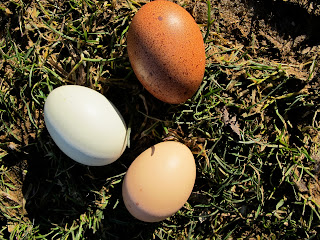But now we're back in the swing, days end earlier, littles must be in bed sooner. And that means dinner on the table, before pronto. Here's a little trick: eggs. (Also great -- see below for effects on memory and learning -- for cash-strapped college students, who I hope are reading this blog!)
 | ||
| Eggs from the happy chickens at Hummingbird Hill are divine, but studies show even experts can't tell the difference in taste between free range and store bought eggs. |
There's many ways to cook an egg. My favorite: over easy, yolks so runny they will sauce whatever else is on your plate (salmon hash, if you have a can of good wild salmon). But they are versatile for the whole family -- my 6-year-old will always eat a cheesy omelet, which does double duty by using up the leftover cheese ends too small to be useful for anything else in the cheese drawer.
Protein contains amino acids, the essential building blocks of the body. And get this: we lose protein every day when we shed skin, hair and nails. So re-upping our supply is crucial, especially if active. Animal proteins -- lean poultry, meat and fish, and low-fat dairy -- contain a complete array of amino acids, but those more inclined to a plant-based diet needn't worry. Plants too contain amino acids, though not the entire spectrum, making them suppliers of incomplete protein.
There's much to be said for protein, especially in highly bioavailable forms like protein powders and shakes, which go directly to the muscle rather than being digested and disseminated via the stomach. A recent study from Brescia University in Milan showed that protein powders containing three amino acids that we are unable to make on our own -- in particular leucine, which is the only amino acid capable of synthesizing protein in muscle -- can lengthen lifespan by up to 12% by activating the mitochondria in cells, which then slow the aging process. That's ten years for the average adult.
And egg yolks also contain choline, essential for regulating metabolic pathways and maintaining cell membranes that allow cells to get rid of toxins, as well as development of cells in the hippocampus crucial for mental acuity and development. Pregnant women, in particular, can benefit from increased choline as it can aid in developing these brain functions in the fetus and, according to research published in the journal Brain Research, can have aftereffects on brain development leaving an afterglow that helps resist age-related memory decline.
So go ahead, eat your eggs.
Easy Anytime Crepes
1 cup milk
1 cup plus 2 tablespoons flour
2 tablespoons sugar
2 extra large eggs
4 tablespoons butter
Melt 2 Tablespoons of butter and cool. Put milk, flour, eggs, sugar and pinch of salt in blender and whiz together. Add butter and blend.
In an 8-inch nonstick skillet, melt 1 teaspoon butter. Pour a thin layer of batter into skillet and swirl to coat the bottom. Cook over medium heat until little air bubbles appear then turn over and cook 30 seconds more.
Remove crepe from skillet and hold on a warm plate with a dish towel to cover, or in the oven. Serve filled with anything -- we like brown sugar, or thick preserves.
Enjoy!











